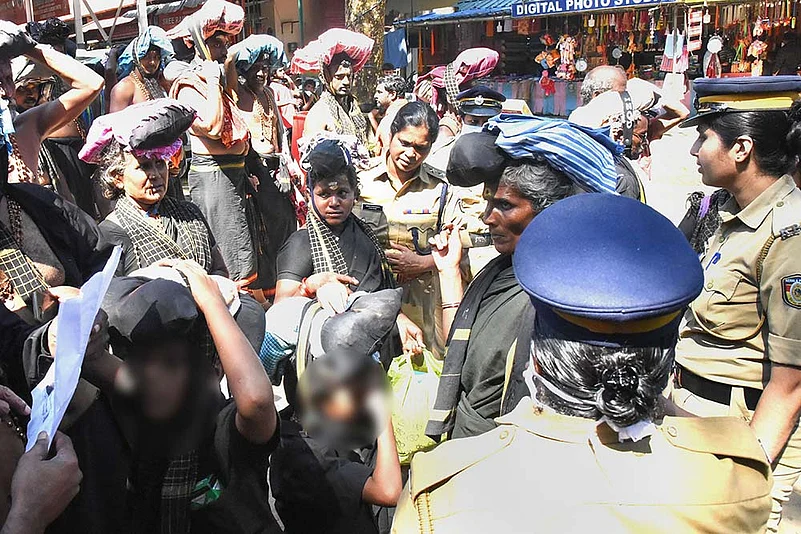The firecrackers left over in Jithu K.’s Diwali hoard took to the night sky on November 9 in celebration of the Supreme Court’s verdict on the Ayodhya dispute. It was the one indulgence the 37-year-old techie had allowed himself during the traditional 41-day ‘cleansing period’ before his annual pilgrimage to Sabarimala. So when, on November 14, the apex court pronounced its intent to revisit its September 2018 verdict removing restrictions on the entry of women of menstruating age to the hill-top shrine, all that the “life-long” RSS volunteer could do was “exercise restraint”. A five-judge Constitution bench headed by then Chief Justice Ranjan Gogoi in a narrow 3:2 verdict took cognisance of some 65 review petitions and clubbed the Sabarimala issue with wider religious questions, including those of other communities.
As the LDF government vacillated between expressing its commitment to the judgment and the search for clarity, the “very fact that the SC understood that the issue needed to be studied further is a victory for all right-thinking devotees of Lord Ayyappa,” says Jithu. “The injustice was recognised. Our efforts were rewarded.” Last year, the Trivandrum resident made the nearly four-hour trip to the foot of the mountain “a few times” to stand in solidarity with the Sabarimala Karma Samithi, the RSS-backed umbrella forum of right-wing groups that spearheaded the protests against women visitors.
The first week of the two-month pilgrimage season, which runs from mid-November to mid-January, has seen more than three lakh footfalls and generated around Rs 17 crore in revenue—an over 50 per cent increase from the same period last year. Unlike last year, when women activists mounted a series of attempts to offer prayers, this season has thus far been relatively quiet, with two instances of police barring entry to women in the restricted 10-50 age group being attributed to out-of-state visitors’ ignorance of the tradition.

A Hindu-right wing cadre attacks activist Bindhu Ammini with pepper spray.
Devaswom minister Kadakampally Surendran, whose department oversees the socio-religious trusts that manage the temples, says, “Any woman seeking police protection to visit Sabarimala will have to produce a court order. The government won’t allow any publicity-seeking displays of activism and dramas under the pretext of darshan at the temple, nor is it inclined to provide police protection to any such individuals.” The minister made specific reference to Pune-based right to pray activist Trupti Desai, who had publicly vowed to visit Sabarimala this season as an attempt last year got no further than Kochi airport after thousands of protestors turned up. Desai, who leads the gender-justice organisation Bhumata Brigade, has since doubled down on that pledge: she arrived in Kochi armed with the 2018 order on November 26, the 70th Constitution Day, and intends to visit the shrine. Earlier, the police had denied an application by activist Rehana Fathima—who drew the Sangh Parivar’s ire last year over her social media posts and an “objectionable” selfie taken prior to her thwarted attempt to climb the mountain—seeking protection for her planned visit to the Sannidhanam area. That Fathima was one of six women who had been granted a police escort last year is further illustration of the government’s apparent downshift.
Meanwhile, women’s rights groups in the state are moving to facilitate requests to visit the shrine coming from all over the country. Bindhu Ammini, a lawyer from Kozhikode who, together with Kanakadurga, a former Kerala State Civil Supplies Corporation employee, was the first woman to offer darshan at the temple after the verdict in a daring overnight ascent on January 2 that prompted the temple priests to perform purification rituals. She says that “hundreds of women from all over India” have reached out to the Renaissance Kerala Women’s Collective seeking support. Terming both the SC decision and the state government’s volte-face “disappointing”, Ammini says, “It’s a political verdict like Ayodhya and will only cause delay in judgment. This interim order protects all the political parties while going against democratic principles, our constitutional rights and gender justice norms. It was unnecessary to club the case of women’s entry into Sabarimala along with questions from other faiths.”
Other activists, however, urge discretion and diligence given the ostracisation of and violence against women of menstruating age who make the trip. Both Ammini and Kanakadurga were targets of death threats and verbal/online abuse. Recently, Ammini was hospitalised after she was attacked with chilli powder and pepper spray in Kochi by a purported member of a right-wing outfit. Shreyas Kanaran, a member of the Renaissance Kerala for Sabarimala, says, “Any wider movement should first ensure that women will be safe before, during and after their visit. Last year, the women who tried did not get anything beyond token appreciation from civil society and progressive groups when hooligans were hounding them and disrupting their lives. Even before the verdict, many women had entered without any spotlight thrown on them. After the verdict, however, there has been an added element of risk.”
This risk, activists say, has been compounded by both the state government “throwing them under the bus” and the inflammatory rhetoric from other corridors of power. Junior external affairs minister V. Muraleedharan’s comments calling for proof that devotees visiting the temple were not “actually urban naxals, anarchists and atheists” found mirror in remarks by BJP state spokesperson K. Surendran, whose frontline efforts last year elevated him from rabble-rouser to party nominee in last month’s by-election in Konni. Surendran welcomed the government’s decision to not provide police protection to the “activists and urban naxals” going to Sabarimala, while warning the government against any “misadventures like last time”. The UDF is toeing the same line with opposition leader Ramesh Chennithala calling on the state government to “not create any issues” and demanding withdrawal of its affidavit in the SC that he says was “filed in favour of women’s entry into the shrine without consideration for people’s beliefs”.
On the ground, meanwhile, the temple town remains tranquil after being stifled by a security clampdown last season. Despite a large police bandobast—the first phase of deployment from November 15-29 saw 2,551 police personnel posted in and around the temple complex—there are no major impediments to pilgrim movements besides routine checking. The police presence will swell in the coming weeks to over 3,000 personnel, besides some 8,400 civil police officials, from December 30 till the temple closes on January 21. The duty roster includes 307 women personnel.
A police officer in Pampa, one of the main pilgrim transport and accommodation hubs near the shrine, says, “Every arrangement is being made to ensure all pilgrims have a tranquil visit. If any issues arise, we will deal with these on a case-by-case basis.” The Pathanamthitta district administration echoes this statement. “There are no restrictions on devotee movements beyond routine checking and normal security arrangements to ensure the safety of pilgrims. Ideally, they shouldn’t need to, but if any women devotees do approach with a court order, we will strategise as the situation warrants,” says district collector P.B. Nooh.
As Jithu prepares for another climb up the pathinettampadi—the 18-step path leading to the sanctum sanctorum where, tradition holds, pilgrims rise out of the ‘slough of despond’, leaving behind doubts, fears, temptations and other base passions—all he wants is the opportunity to partake in his Lord’s chant and worship in peace. As for the women who have bought spots on that ‘stairway to heaven’, they are hoping the tune will come to them at last.


























